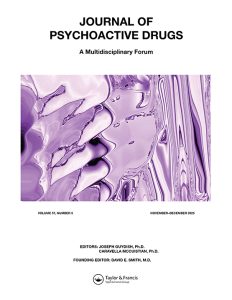 The intersection of psychedelics and addiction recovery is a topic that is gaining increasing attention as more people explore alternative paths to healing. However, for those who participate in traditional 12-step programs like Alcoholics Anonymous (AA), discussing the use of psychedelics for therapeutic purposes can be a delicate and potentially controversial subject. If you’re considering whether to be open about your psychedelic use in a traditional AA meeting, it’s important to weigh the potential benefits and risks. This article explores the factors you should consider before making your decision.
The intersection of psychedelics and addiction recovery is a topic that is gaining increasing attention as more people explore alternative paths to healing. However, for those who participate in traditional 12-step programs like Alcoholics Anonymous (AA), discussing the use of psychedelics for therapeutic purposes can be a delicate and potentially controversial subject. If you’re considering whether to be open about your psychedelic use in a traditional AA meeting, it’s important to weigh the potential benefits and risks. This article explores the factors you should consider before making your decision.
Understanding the AA Philosophy
Alcoholics Anonymous, founded in 1935, is one of the oldest and most well-known recovery programs in the world. The AA program is built around a set of 12 steps, which emphasize surrendering to a higher power, rigorous self-examination, making amends, and helping others in their recovery journey. Central to AA’s philosophy is the belief in total abstinence from alcohol and any other mind-altering substances, including drugs.
Given this context, AA traditionally views any substance use, even for therapeutic purposes, as potentially harmful to sobriety. This perspective can create challenges for individuals who are exploring or have used psychedelics as part of their healing journey, especially in settings where the emphasis is strictly on abstinence.
The Role of Psychedelics in Healing
In recent years, psychedelics like psilocybin, LSD, ayahuasca, and MDMA have gained attention for their potential to aid in the treatment of various mental health issues, including addiction. Research has shown that these substances, when used in controlled, therapeutic settings, can lead to profound personal insights, emotional healing, and lasting changes in behavior. Many people who have struggled with addiction have found that psychedelics helped them address underlying trauma, develop greater self-awareness, and reconnect with a sense of purpose—all of which are crucial to sustained recovery.
Despite these promising findings, the use of psychedelics remains controversial, particularly within traditional recovery communities like AA. This is due in part to the program’s long-standing emphasis on abstinence and its cautious stance toward any mind-altering substances.
Potential Benefits of Honesty
- Authenticity and Integrity: For some, being honest about their use of psychedelics is an important aspect of living authentically and maintaining personal integrity. If you have found healing and transformation through psychedelics, sharing this part of your journey could help you feel more aligned with your truth.
- Supporting Others: By sharing your experience, you might provide support to others in the group who are also struggling with their recovery or are considering alternative approaches. Your honesty could spark valuable discussions about the diverse paths to healing, potentially helping to reduce stigma and open minds.
- Building Trust: Being open about your psychedelic use could help build trust with others who might be considering or are curious about non-traditional methods. It can foster a sense of community among those who are also exploring or have used psychedelics in their recovery.
Potential Risks of Honesty
- Stigma and Judgment: Traditional AA meetings are often populated by individuals who firmly believe in the program’s tenets, including total abstinence. Disclosing your use of psychedelics could lead to stigma, judgment, or even ostracism from the group. Some members might view your use of psychedelics as incompatible with the principles of AA.
- Disrupting the Group Dynamic: AA meetings are designed to provide a safe and supportive environment for individuals to share their experiences and struggles. Introducing a topic as potentially controversial as psychedelic use could disrupt the group dynamic, making others uncomfortable or defensive.
- Impact on Your Recovery: If your honesty leads to negative reactions from the group, it could affect your sense of belonging and support within the AA community. This, in turn, could impact your recovery journey, especially if AA is a key component of your support network.
Alternative Approaches
If you decide that being honest about your psychedelic use in a traditional AA meeting might be too risky, there are alternative approaches to consider:
- Private Conversations: You might choose to share your experience with a few trusted members of the group in private, rather than during a meeting. This approach allows for a more controlled and potentially less confrontational discussion.
- Finding Like-Minded Communities: There are recovery communities that are more open to alternative methods, including psychedelic use. For example, groups like Psychedelics in Recovery offer a space for individuals to discuss their experiences with psychedelics within the context of 12-step recovery.
- Starting a New Group: If you find that your traditional AA group is not open to discussing psychedelics, you might consider starting a new group or meeting that specifically addresses alternative recovery methods. This could provide a supportive environment for those who are exploring similar paths.
Deciding whether to be honest about your psychedelic use in a traditional AA meeting is a deeply personal choice. It requires careful consideration of the potential benefits and risks, as well as an understanding of the specific dynamics of your group. While honesty can foster authenticity and support, it may also lead to stigma and disruption. Ultimately, the decision should be based on what you believe will best support your recovery and well-being. If you choose not to disclose your psychedelic use in AA, remember that there are other communities and resources available that can provide support on your journey.




